Hyper Personalized Medicine Market Research, 2031
The global hyper personalized medicine market size was valued at $2.1 trillion in 2021, and is projected to reach $5.9 trillion by 2031, growing at a CAGR of 11.7% from 2022 to 2031.Hyper personalized medicine is the customizing of medical therapy to the unique characteristics of each patient. The technique is based on scientific advances in the understanding of how a person's unique molecular and genetic profile makeup them to particular diseases. Hyper personalized medicine is improving the ability to forecast which medical treatments are safe and effective for each patient and which are not.Hyper personalized medicine is the customizing of medical therapy to the unique characteristics of each patient. The technique is based on scientific advances in the understanding of how a person's unique molecular and genetic profile makeup them to particular diseases. Hyper personalized medicine is improving the ability to forecast which medical treatments are safe and effective for each patient and which are not.
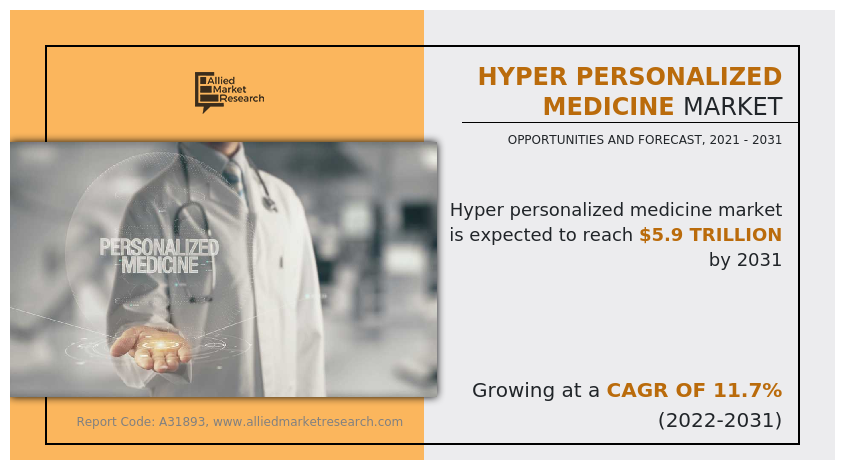
Customized medicine can be considered as an extension of existing approaches to illness understanding and treatment. With more precise techniques, clinicians can choose a medication or treatment regimen based on a patient's molecular profile, which can not only reduce dangerous side effects but can also help restrict costs when compared to a ‘trial-and-error’ approach.
The development of efficient and advanced technology, increasing public awareness about hyper personalized medicine, rising government initiatives around the world, and the growing development of genetic databases are the primary growth drivers of the global hyper personalized medicine market. Furthermore, rise in customized medicine usage in neurology, pulmonary medicine, antiviral medicine, and psychiatry, as well as emerging economies, is projected to provide new opportunities for the global hyper personalized medicine market growth.
Lack of insurance coverage for genetic testing, which is a required test to detect mutations and prescribe personalized medicines, is a major problem impeding the growth of the global highly personalized medicine market. Depending on the type and complexity of the test, the cost of genetic testing can range from $2,000, according to statistics from the U.S. National Library of Medicine published in September 2019. The price goes up if numerous tests are required to get a significant result or if several family members need to be tested. This is a major factor projected to hamper the hyper personalized medicine market opportunity during the forecast period.
Hyper-precision medicine is a medical concept where treatment is increasingly targeted for specific patients and subgroups owing to recent technological advancements. In general, this approach entails modifying components of the patient pathway such as referral, advice, or treatment based on their disease risk, prognosis, or expected treatment response—a process that can benefit both patients and the healthcare system. The 'hyper-precision' is informed by methods that combine genetic, environmental, and lifestyle data, and varies from risk equations to genetic testing. Precision medicine technology progress is projected to continue, led by programs such as the Precision Medicine Initiative and genomes Project. This breakthrough is likely to affect the way healthcare services are organized and delivered: the development of new molecular testing infrastructure and the development of 'learning' health information systems that analyze molecular and health-record data to advise future prevention, detection, or treatment strategies are two possibilities mentioned.
The hyper personalized medicine industry players are also investing a lot of effort on the R&D of smart and unique strategies to sustain their growth in the market. These strategies include product launches, mergers & acquisitions, collaborations, partnerships, and refurbishing of existing technology. For instance, in May 2022, Illumina unveiled a new pan-cancer companion diagnostic to match patients with rare genetic mutations to targeted therapy. For instance, in November 2022, The University of Pécs (UP) and BGI Genomics decided to open a collaborative lab in Hungary. The collaborative lab will begin formal operations in order to strengthen BGI Genomics' and the UP's avant-garde precision medicine advancements in the Central and Eastern European region and to speed the development of genomic sequencing and clinical diagnostic services.
The hyper personalized medicine market analysis of key players profiled in this report include QIAGEN, Exagen Inc., Abbott, Dako A/S, GE Healthcare, Illumina, Inc., ASURAGEN, INC., Exact Sciences Corporation, Danaher Corporation (Cepheid, Inc.), and Decode Genetics, Inc.
The hyper personalized medicine market is segmented on the basis of product, application, end user, and region. By product, the market is classified into hyper personalized medicine diagnostics, hyper personalized medicine therapeutics, hyper personalized medical care, and hyper personalized nutrition & wellness. By application, the market is divided into oncology, neurology, blood transfusion safety, diabetes, autoimmune diseases, and cardiology. By end user, the market is classified into hospitals, diagnostic centers, research and academic institutes, and others. By region, the market is analyzed across North America, Europe, Asia-Pacific, and LAMEA.
The hyper personalized medicine market is segmented into Product, Application and End User.
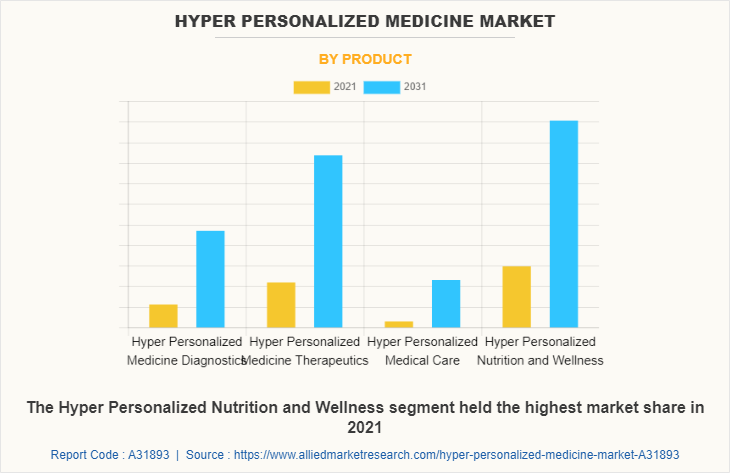
By product, the hyper personalized nutrition and wellness sub-segment dominated the market in 2021. The growth of the segment is due to the extensive consumption rate and market penetration. Furthermore, the high rate of over-the-counter (OTC) nutrition product sales boosts demand for hyper personalized medicine due to reduced regulatory implications. For example, according to a March 2022 American Heart Association article, nutrition specialists are developing precision nutrition to treat cardiovascular disorders based on individual responses to particular meals and nutrients.
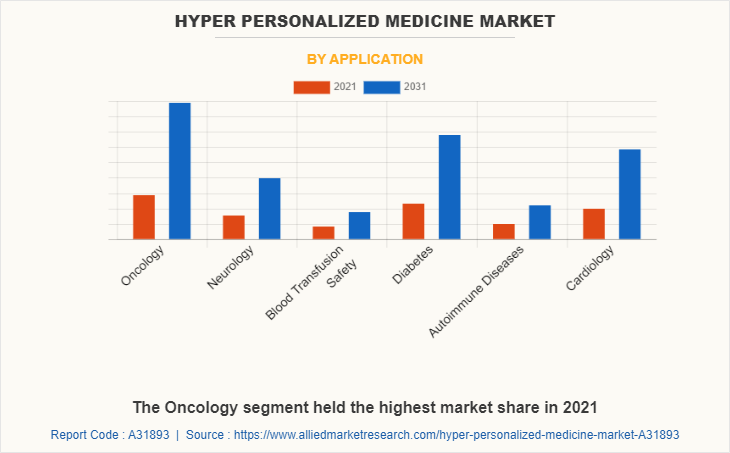
By application, the oncology sub-segment dominated the global hyper personalized medicine market share in 2021. A variety of factors, including an increase in cancer occurrences and mortality rates related to the disease, multiple government initiatives, and a growing public awareness of molecular-level diagnosis and therapy, promote the current market for oncology hyper customized medicine. Furthermore, advancements in molecular diagnostics, an increase in FDA approval of such precision medicine-based oncology treatments, and a higher priority placed on R&D operations by major healthcare corporations are all factors influencing the hyper personalized medicine market share.
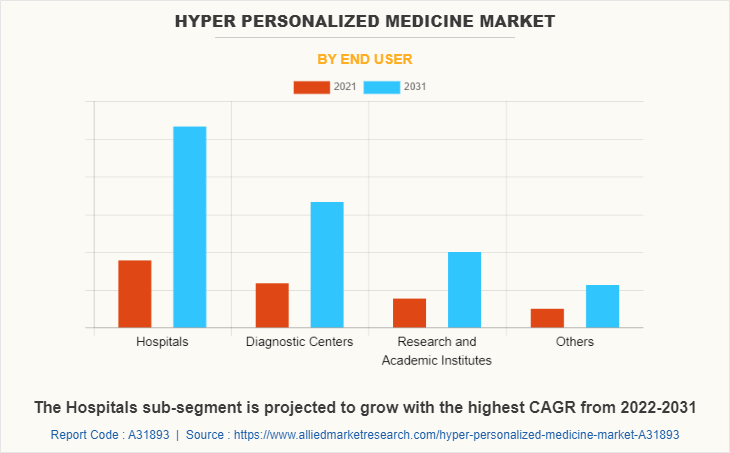
By end user, the hospitals sub-segment dominated the global hyper personalized medicine market share in 2021. Advances in diagnostic techniques, cutting-edge infrastructure, and providing the best available services to the patient population are some of the factors influencing the segment growth. Furthermore, public awareness of the importance of hyper personalized medicine has increased in the last few years. The growing demand for predictive diagnostic testing for cancer in hospitals, genetic disorders, pulmonary illnesses, and other diseases, is projected to drive the hyper personalized medicine market share growth.
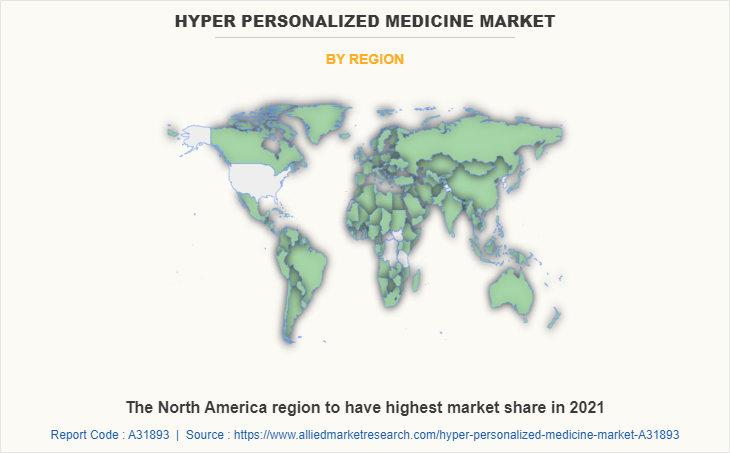
By region, North America dominated the global market in 2021 and is projected to remain the fastest-growing region during the forecast period. The advancement of next-generation sequencing technologies, as well as the implementation of health information technology systems, are assisting in the growth of the hyper personalized medicine industry in North America. These technologies make it easy to obtain customized pharmacogenomic data in a timely and convenient manner. Furthermore, hyper personalized medicine is now preferred for all types of diseases, and it is therefore a component of disease research and drug discovery. In the region, there are emerging advances in personalized medicine for diagnostics. All these factors are anticipated to boost hyper personalized medicine market size in North America region.
Impact of COVID-19 on the Global Hyper Personalized Medicine Industry
- The pandemic of COVID-19 had an impact on the market for hyper personalized medicine. For instance, in May 2021, an article published in the JAMA Network described personalized medicine approaches that emphasize more precise diagnosis and treatment based on a variety of biomarkers, such as genetic variants and data about patients' lifestyle, behaviors, and environment, which are useful in understanding differences in individuals' susceptibility to COVID-19 and responses to it.
- The COVID-19 pandemic led to an increase in demand for precision medicine. However, with the emergence of new SARS-CoV-2 strains and the presence of new diseases, it is expected that demand for precision medicine will continue to rise in the post-pandemic period.
- Furthermore, commonly used drugs such as hydroxychloroquine have seen a dramatic increase in demand for COVID-19 management. As many developed countries faced a shortage of these drugs, the high demand for COVID-19 management drugs created enormous opportunities for medicine manufacturers. As a result of the demand for COVID-19 vaccines and treatment drugs, the pharmaceutical and biotechnology industries are expected to grow significantly in the post-pandemic period.
Key Benefits For Stakeholders
- This report provides a quantitative analysis of the market segments, current trends, estimations, and dynamics of the hyper personalized medicine market analysis from 2021 to 2031 to identify the prevailing hyper personalized medicine market forecast.
- The market research is offered along with information related to key drivers, restraints, and opportunities.
- Porter's five forces analysis highlights the potency of buyers and suppliers to enable stakeholders make profit-oriented business decisions and strengthen their supplier-buyer network.
- In-depth analysis of the hyper personalized medicine market segmentation assists to determine the prevailing market opportunities.
- Major countries in each region are mapped according to their revenue contribution to the global market.
- Market player positioning facilitates benchmarking and provides a clear understanding of the present position of the market players.
- The report includes the analysis of the regional as well as global hyper personalized medicine market trends, key players, market segments, application areas, and market growth strategies.
Hyper Personalized Medicine Market Report Highlights
| Aspects | Details |
| Market Size By 2031 | USD 5.9 trillion |
| Growth Rate | CAGR of 11.7% |
| Forecast period | 2021 - 2031 |
| Report Pages | 280 |
| By Product |
|
| By Application |
|
| By End User |
|
| By Region |
|
| Key Market Players | ASURAGEN, INC., Abbott, Illumina, Inc., Decode Genetics, Inc., GE Healthcare, Dako A/S, Exact Sciences Corporation, Danaher Corporation (Cepheid, Inc.), QIAGEN, Exagen Inc. |
Analyst Review
The increase in understanding and correlation of human genome characteristics has created an environment for efforts to develop various hyper personalized medicine and therapeutic exercises. For example, in September 2022, a study from the University of California, Irvine offered a unique method for treating inherited retinal diseases (IRDs) that makes use of precise genome editing that is customized to each person's need. However, the high costs of diagnosis and personalized medicine are predicted to hamper the hyper personalized medicine market growth rate. Furthermore, the increase in the number of R&D activities is expected to provide beneficial opportunities for the growth of the hyper personalized medicine market. Also, there will be advantageous prospects for the expansion of the hyper personalized medicine market during the forecast period, due to manufacturers' increase in emphasis on the adoption of cutting-edge technologies and the rise in the number of emerging markets.
Among the analyzed regions, North America is expected to account for the highest revenue in the market by the end of 2031, followed by Asia-Pacific, Europe, and LAMEA. The increase in the use of healthcare information technology systems in clinical workflows, as well as next-generation sequencing technologies that help generate custom-made and pharmacogenomic data quickly and easily, are the key factors responsible for the leading position of North America and Asia-Pacific in the global hyper personalized medicine market.
The growing desire for tailored treatment alternatives, as well as growing knowledge about the potential benefits of hyper personalized medicine, are some of the key driving factors for the hyper personalized medicine market. Advances in genetics, bioinformatics, and other related sciences have also considerably contributed to the expansion of this market.
The major growth strategies adopted by hyper personalized medicine market players are investment and agreement.
Asia-Pacific will provide more business opportunities for the global hyper personalized medicine market in the future.
QIAGEN, Exagen Inc., Abbott, Dako A/S, GE Healthcare, Illumina, Inc., ASURAGEN, INC., Exact Sciences Corporation, Danaher Corporation (Cepheid, Inc.), and Decode Genetics, Inc. are the leading market players active in the hyper personalized medicine market.
The hospitals sub-segment of the end user acquired the maximum share of the global hyper personalized medicine market in 2021.
Diagnostic centers are the major customers in the global hyper personalized medicine market.
The report provides an extensive qualitative and quantitative analysis of the current trends and future estimations of the global hyper personalized medicine market from 2022 to 2031 to determine the prevailing opportunities.
Loading Table Of Content...



